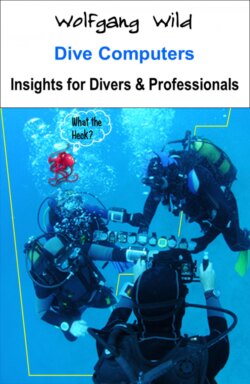Читать книгу Dive Computers – Insights for Divers & Professionals - Wolfgang Wild - Страница 3
На сайте Литреса книга снята с продажи.
Оглавлениеx
Introduction
What exactly does “conservative” mean in diving?
Dive Tables – the STUP effect
An example for reliably developed, validated and documented dive tables – the Recreational Dive Planner (RDP)
Reflections on a proper ascent rate
Excursus – How do divers control their ascent rate?
Saturation, halftime and M-value
Halftime
M-value
Doppler ultrasound and other ways to detect bubbles in our tissues
Understanding decompression sickness
”Tissue Model” vs. “Bubble Model”
Tissue Model / 1-phase model
Bubble Model / 2-phases model – Part One
The Buhlmann models ZH-L12 and ZH-L16
Gradient factors
Bubble Model / 2-phases model – Part Two
The attack on bubbles at depth
The VPM model
The RGBM model
Deep Stops – what is that?
Which stop-depth is the correct one?
What to do? STUP is for divers no real alternative!
Dive computers in practice
From table towards computer – multilevel diving
Preliminary evaluations of dive data banks – Wienke & DAN
Dive Computers 1994 – results of own practice tests
Dive Computers 2009 – practice test magazine Diver
Dive Computers 2009 – practice test magazine Scuba Diving
Practice tests in the hyperbaric chamber – Catalina Island (USA) 2011
The crux with technology
Closing chapter and perspectives
Requirements for the validation of dive computers
Dreams of the future – alternatives to the traditional dive computer
Bibliography and Internet Links
